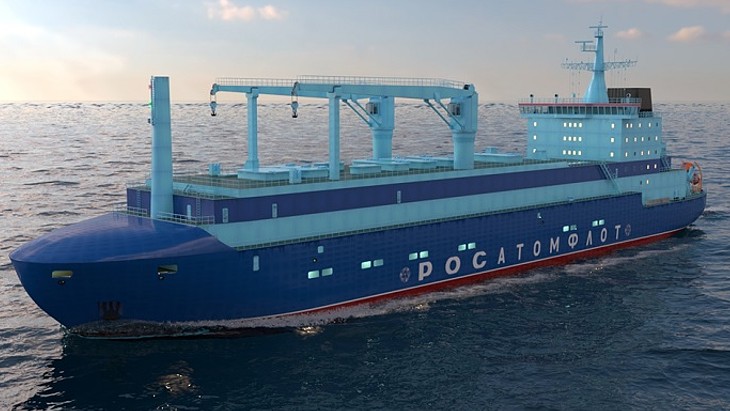Contract signed for Russian multifunctional nuclear service vessel
The Baltic Shipyard (Baltiysky Zavod) has signed a contract with Atomflot for the construction of a multifunctional nuclear technology service vessel which can load and unload nuclear fuel from reactor units of nuclear icebreakers and floating power units.

The aim is for the vessel to be ready in 2029 (Image: Rosatom)
The multifunctional vessel is also designed to safely accept, store and ship "liquid radioactive waste generated during the operation of ship reactor installations, as well as in the process of reloading nuclear fuel and soaking of spent fuel assemblies in order to reduce residual heat release". It will also be able to load used fuel assemblies into shipping containers for transfer to reprocessing as well as tackling decontamination of removable parts of ship reactor plants and refuelling equipment.
According to Rosatom the vessel will be 158.8 metres long, 26 metres wide and have a displacement of 22,661 tonnes. It will be 50% financed from the Russian federal budget and 50% from Rosatom's investment programme, with a planned completion date of 2029.
The contract was signed by acting director general of Atomflot Leonid Irlitsa and Baltic Shipyard CEO Yuri Gordienkov.
At present refuelling reactors of nuclear icebreakers is provided by a vessel commissioned in 1980. Irlitsa said: "We are moving forward. Three universal nuclear-powered icebreakers (from Project 22220) operate in the waters of the Northern Sea Route. To solve new problems, a multifunctional nuclear-technological service vessel is required. It will ensure the recharging of reactors on Project 22220 nuclear-powered ships."
Alexei Rakhmanov, director general of Baltic Shipyard's owner United Shipbuilding Corporation, said: "The transition to full life-cycle contracts is a modern trend in many industries. Therefore, when building nuclear-powered icebreakers today, we must simultaneously think about how to efficiently and economically carry out their maintenance in 10, 20, 30 years. Starting to build a multifunctional nuclear-technological service vessel, we want to ensure the long and safe operation of nuclear-powered icebreakers, floating nuclear power units and, in general, the entire Atomflot."
Russia is in the process of rolling out a new fleet of nuclear powered icebreakers under Project 22220, with the aim of opening up and developing the Northern Sea Route.
Researched and written by World Nuclear News
- China Institute of Atomic Energy
- Nuclear Power Institute of China
- Southwestern Institute of Physics
- China Nuclear Power Operation Technology Corporation, Ltd.
- China Nuclear Power Engineering Co., Ltd.
- China Institute for Radiation Protection
- Beijing Research Institute of Uranium Geology (BRIUG)
- China Institute of Nuclear Industry Strategy (CINIS)
- China Nuclear Mining Science and Technology Corporation


